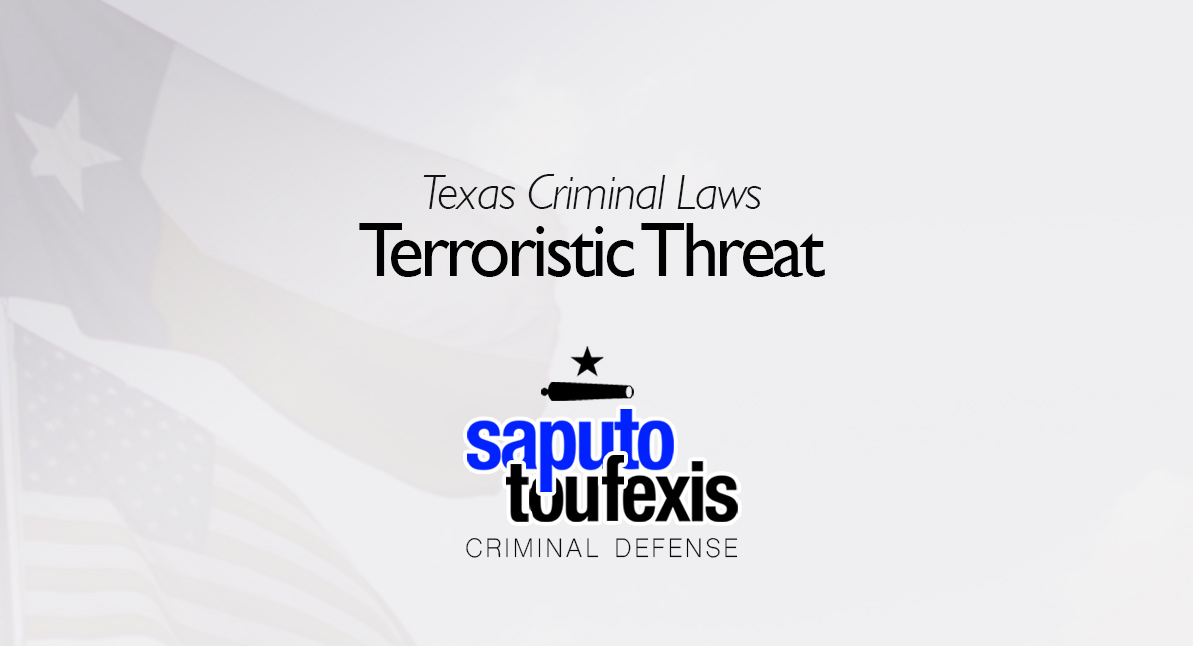The Texas Terroristic Threat law gives police the right to arrest you if they believe you threatened to commit a violent offense in order to cause a disturbance or harm.
FAQs about the
Terroristic Threat law in Texas
- What is the current Texas law about Terroristic Threat?
- What is the penalty for a Texas Terroristic Threat offense?
- How can I be charged with a Terroristic Threat offense in Texas?
- What is the statute of limitations for Terroristic Threat in Texas?
- Can you get probation for Terroristic Threat in Texas?
- What level of crime is Terroristic Threat in Texas?
The Terroristic Threat offense is described as a “specific intent” type of offense primarily because prohibiting speech is difficult to do without infringing on the constitutional rights of free speech.
Have you been charged with Terroristic Threat? Contact us today to discuss legal representation.
or Text or Call (888) 239-9305
The Texas legislature codified this criminal offense in Texas Penal Code Section 22.07. The law was not amended in 2025. The law was most recently amended in 2017 when the legislature created a state jail felony enhancement for offenses committed against peace officers and judges.
Terroristic Threat is closely related to the Assault by Threat law.
The Penal Code classifies the Texas Terroristic Threat law under Title 5 “Offenses Against The Person,” Chapter 22 “Assaultive Offenses.” Learn more about the Texas offense of Terroristic Threat below.
What is the current Texas law about Terroristic Threat?
AV Preeminent Texas lawyer Paul Saputo provides the current law defining Terroristic Threat in Penal Code Section §22.07, as follows:[1]
(a) A person commits an offense if he threatens to commit any offense involving violence to any person or property with intent to:
(1) cause a reaction of any type to his threat by an official or volunteer agency organized to deal with emergencies;
(2) place any person in fear of imminent serious bodily injury;
(3) prevent or interrupt the occupation or use of a building, room, place of assembly, place to which the public has access, place of employment or occupation, aircraft, automobile, or other form of conveyance, or other public place;
(4) cause impairment or interruption of public communications, public transportation, public water, gas, or power supply or other public service;
(5) place the public or a substantial group of the public in fear of serious bodily injury; or
(6) influence the conduct or activities of a branch or agency of the federal government, the state, or a political subdivision of the state.
What is the penalty for a Texas Terroristic Threat offense?
If the offense falls under subsection (a)(1), then a conviction for Terroristic Threat in Texas is punished as a Class B misdemeanor,[2] with a maximum possible fine under Texas state law of up to $2,000 and jail time of up to 180 days.
If the offense falls under subsection (a)(2), it is punished as a Class B misdemeanor, unless the offense was committed against a family member or public servant, in which case a conviction for Terroristic Threat in Texas is punished as a Class A misdemeanor,[3] with a maximum possible fine under Texas state law of up to $4,000 and jail time of up to one year.
If the offense falls under subsection (a)(3), it is punished as a Class A misdemeanor unless loss to the building is $1,500 or more, in which case it is punished as a state jail felony.[4]
If the offense falls under subsection (a)(4), (5), or (6) then a conviction for Terroristic Threat in Texas is punished as a Felony of the Third Degree,[5] with a maximum possible fine under Texas state law of up to $10,000 and prison time of up to 10 years.
Amendments effective in 2017
In 2017, the legislature created a new enhancement that makes a Terroristic Threat conviction a state jail felony “if the offense is committed against a person the actor knows is a peace officer or judge.”[6]
How can I be charged with a Terroristic Threat offense in Texas?
You can be charged with Terroristic Threat in Texas if the state’s attorneys believe that each of the elements of §22.07(a) as described in the section above have been met.
What is the statute of limitations for Terroristic Threat in Texas?
Misdemeanor level Terroristic Threat charges have a two-year limitations period.[7] Felony level offenses follow the default felony limitations period rule, which specifies a three-year limitations period.[8]
Can you get probation for Terroristic Threat in Texas?
The Texas Code of Criminal Procedure allows both judges and juries to grant probation for Terroristic Threat, and judges are also allowed to accept deferred adjudication plea deals.[9]
Note, however, that no matter the offense, neither judges nor juries may recommend community supervision for any suspended sentence of over 10 years.[10] Also, judges may not grant community supervision after a conviction if (1) the defendant used or exhibited a deadly weapon during the commission of the felony or immediate flight thereafter and (2) the defendant used or exhibited the deadly weapon himself or was a party to the offense and knew that a deadly weapon would be used or exhibited.[11]
What level of crime is Terroristic Threat in Texas?
The Penal Code classifies the punishment for Terroristic Threat as a Class B misdemeanor, Class A misdemeanor, state jail felony, or third degree felony, depending on the circumstances.
Learn more about the penalty range for this offense in the section above.
Legal References:
^1. Texas Penal Code §22.07. This law is current as of 2025.^2. Texas Penal Code §22.07(b)^3. Texas Penal Code §22.07(c)^4. Texas Penal Code §22.07(d)^5. Texas Penal Code §22.07(e)^6. Texas Penal Code §22.07(c-1), as enacted by HB 2908, 85th Texas Legislature, Section 4^7. Code of Criminal Procedure 12.02(a)^8. See Code of Criminal Procedure 12.01(11)^9. See Chapter 42A, Texas Code of Criminal Procedure, Art. 42A.054, Art. 42A.056, Art. 42A.102^10. Art. 42A.053(c), Texas Code of Criminal Procedure^11. Art. 42A.054(b), Texas Code of Criminal Procedure










